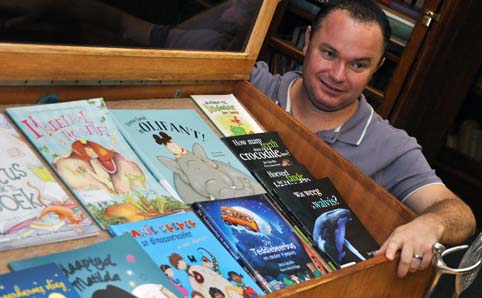 |
|
Department of Afrikaans and Dutch, German and French receives more than 70 books, manuscripts and translations from Kovsie alumnus Jaco Jacobs.
Photo: Stephen Collett
4 April 2012
|
The well-known children’s author and former Kovsie, Jaco Jacobs, donated more than 70 of his books, manuscripts and translations to the University of the Free State. The work will be included in the authors’ room of the Department of Afrikaans and Dutch, German and French on the ground floor of the UFS Sasol Library.
Mr. Jacobs is an award-winning author who also worked as editor of Volksblad’s youth supplement, Jip. He received the degree B.A. (Communication Science) cum laude from our university. He has been awarded, amongst others, the Alba Bouwer Prize, C.P. Hoogenhout Award, MML Prize for Literature, Elsabé Steenberg Award and eight ATKV children’s book awards.
Mr Jacobs says he hopes the donations will provide insight into the writing process. “It would be wonderful if someone could do research because youth literature is not a genre that receives a lot of attention.”
Prof. Hennie van Coller, Head of the Department of Afrikaans and Dutch, German and French, says the donation is very valuable in terms of research. He says in other parts of the world, a lot of money is paid for this type of work.